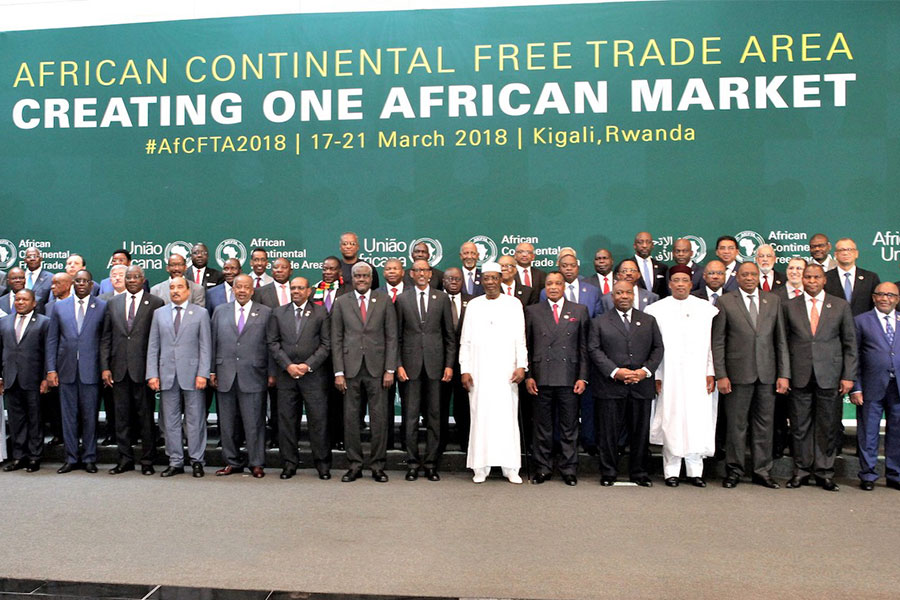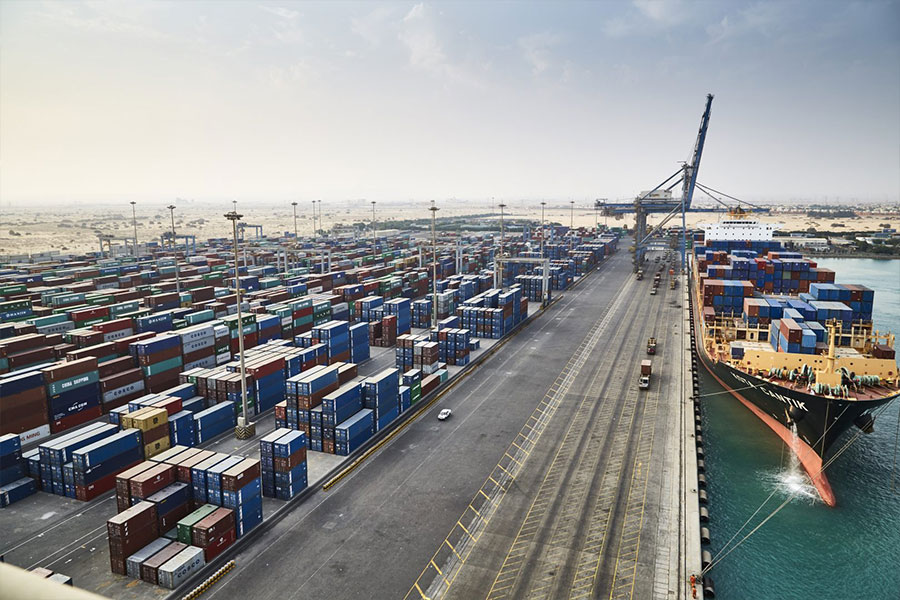
Fortune News | Nov 04,2020
Jul 25 , 2020
By Yonas Biru (PhD)
If Egypt faces an existential threat emanating from the Nile waters, it comes from its mismanagement of the scarce water resources, not from the GERD that uses the power of the water to generate electricity without consuming the water, writes Yonas Biru (PhD) (biruyonas@yahoo.com), the former deputy global manager of the International Comparison Programme at the World Bank and founder and chair of the Nile Club.
The Nile dispute between Ethiopia and Egypt is more than a technical disagreement on when and how the reservoir for the Grand Ethiopian Renaissance Dam (GERD) is filled or how the waters of the Nile are shared. At the bottom, the dispute is driven by Egypt’s unyielding strategic desire to keep Ethiopia’s development in check to maintain the status quo regional balance of power in the Horn of Africa and the Red Sea corridor.
Egypt sees Ethiopia as a threat to its geopolitical strategy of controlling the Red Sea. When Egyptian leaders say the GERD poses an existential threat to Egypt’s water security, they are using the Nile as a proxy for a much larger battle over a shifting regional power balance. The dominant variable in Egypt’s water calculus is maintaining its status as the principal, if not the sole, regional hegemonic power controlling the Red Sea, the foremost strategic maritime passage linking Europe and Asia, and a vital lifeline for the world’s energy security.
When completed, the juggernaut that was to have an installed capacity of 6.4GW be the largest hydroelectric power plant in Africa and the seventh largest in the world. Beyond quenching its thirst for energy, Ethiopia will be able to export electricity to meet the needs of its Sub-Saharan African neighbours.
Egyptian geopolitical strategists see this as the seed for an Ethiopia-centered regional economic integration that will birth a comprehensive economic community seduced by transportation infrastructure projects that will facilitate regional connectivity through a network of low-cost electric powered railway tracks. This will make Ethiopia a concentric growth point for new investment cooperation projects, including coordinated industrial parks and cross-border economic cooperation zones.
Egypt sees the economic expansion of the Horn of Africa coming at the expense of its longstanding regional primacy. With the erosion of its regional primacy will come not only the devaluation of its political currency in the geopolitical power markets but also a perceived threat from a plethora of economically empowered Nile Basin countries.
Keeping Ethiopia poor and underdeveloped is a strategy that Egypt has relied on to maintain its regional primacy and global geopolitical status quo. It is keenly aware, as is the rest of the world, that Ethiopia's potential for hydropower development is enormous.
The GERD “is of similar importance to Ethiopia as the Aswan Dam was for Egypt,” rightly stated the German Institute for International and Security Affairs. “It is not just an infrastructure project, but a project of the century, which should pave the way for the modernisation of the country.”
Modernisation coupled with Ethiopia’s massive population presupposes political and military power. With it comes a seismic shift in the regional power balance.
How does Egypt’s stand pose a threat to Ethiopia?
The GERD is Ethiopia’s bid to spur a transformative and sustainable economic development that will create job opportunities to its restive unemployed youth and combat its population’s chronic poverty. Egypt’s attempt to stop the full operation of the GERD is fueled by the desire to nip Ethiopia’s hope for prosperity and peace in the bud. Without an accelerated and sustainable growth that the GERD is said to turbo-charge Ethiopia’s drive for industrialisation, Ethiopia’s economy will collapse under the weight of its fast growing unemployed, restive and politically charged youth.
Ethiopia is behind sub-Saharan African nations in many key socioeconomic indicators, which was also highlighted in a recent report by eight Ethiopian economists, hydropower engineers and political scientists [including the author of this article].
Its GDP per capita is less than half that of the average for Sub-Saharan Africa and much more below that of Egypt. In terms of secondary school enrollment, Ethiopia is 20pc below Sub-Saharan Africa and 60pc behind Egypt.
Why is Ethiopia lagging behind?
The lack of access to energy is a big part of it as it was also echoed in the report. In terms of access to electricity, measured by kilowatts per capita, “Ethiopia’s number is a mere 14pc of Sub-Saharan Africa, four percent of Egypt and two percent of the World Average,” the report underscores.
Accounting for 70pc of Ethiopia’s annual surface water and two-thirds of its annual surface water, tributaries of the Nile represent 67pc of the hydroelectric power and irrigation potential of the country. The GERD represents the kernel of Ethiopia’s industrialisation strategy energised by a mega hydroelectric power and aimed at the awakening and unleashing of latent economic opportunities that have been left untapped for generations.
Egypt’s justification for blocking Ethiopia’s aspiration for eradicating poverty and promoting prosperity are based on two willfully orchestrated public relations campaigns of misinformation: Ethiopia, a country blessed with an abundance of water, needs not rely on the Nile River for its development, and Egypt’s water security and existence is tied solely to the Nile waters. The dual misconception concocted and spread by Egyptian diplomats and an army of hired PR experts has taken hold in the international arena.
The truth is that “Ethiopia is known as the water tower of Africa, but more than half its population does not have access to a safe and reliable source,” as World Economic Forum states. The UN World Water Development Report also notes that “Ethiopia’s annual renewable freshwater resources amount to some 122 Billion cubic metres (BCM) per year. However, only three percent remains in the country. The rest is lost in runoff to the lowlands of neighbouring countries.”
Ethiopia uses only 1.5 BCM of water for irrigation. To put this in perspective, the corresponding figure for Egypt is 65.5 BCM.
Contrary to popular opinion that is shaped by a systemic campaign of misinformation, Egypt has far more natural water resources than Ethiopia. Its desert hides a trove of groundwater left from the last ice age, spanning more than two million square kilometres, within the geographic proper of Sudan, Chad, Libya and Egypt.
Ethiopia’s 122 BCM surface water pales in comparison to the 150,000 BCM water lurking beneath the arid lands of the four nations, especially Egypt and Libya. This is “more water than the Nile River discharges in 500 years,” notes the American Geophysical Union (AGU), a nonprofit research organisation.
Libya has managed to tap into the vast underground reservoir using a web of pipelines that are collectively referred to as “the Great Man-Made River,” watering the coastal cities of Tripoli, Benghazi and Sirte.
“It’s a gorgeous supply of water - clean, not salty,” said Cliff Voss, a hydrologist at the US Geological Survey on the AGU report. “You can drink it without any filtration or treatment.”
Unlike landlocked Ethiopia, Egypt boasts a 2,900Km-long coastline, offering it enormous potential to use desalination plants to address its water needs. However, instead of decreasing its dependence on the Nile by building desalination plants, Egypt has chosen to spend several dozen billions of dollars to build a new "smart" city.
Egypt has the financial resources to build massive desalination plants to address its water shortage but instead expects Ethiopia to sacrifice its water sources so that it can continue to rely primarily on the Nile.
As a matter of fact, Egypt need not employ massive water pumps to unearth underground waters or spend billions on desalination plants. It can use a robust water management regiment to meet its current water needs even with the GERD in full operation.
The expected amount of saved water using strategies proposed in the paper “exceeds the expected losses caused by GERD by 12.1 billion cubic metres,” concluded a scientific paper by Egyptian professors titled, “Managing Risks of the Grand Ethiopian Renaissance Dam on Egypt.”
What are the primary water management proposals?
Over four-fifths of Egypt's farmland employs flood irrigation, according to the UN-FAO. The method is the least efficient form of irrigation, leading to the loss of enormous amounts of water from evaporation, infiltration and runoff. There is as high as 20pc wastage of the water allocated to the country under the Nile Waters Agreement.
Furthermore, Egypt’s agricultural lands are used to grow water-guzzling products for export, such as cotton, which requires thousands of litres of water to grow just a kilogram of it.
“Growing crops like rice and exporting it is akin to exporting water, which should not be allowed for a country like Egypt,” explained Abdelatif Khalid, who was head of Egypt’s Irrigation Department at the Ministry of Irrigation & Water Resources.
If Egypt faces an existential threat emanating from the Nile waters, it comes from its mismanagement of the scarce water resources, not from the GERD that uses the power of the water to generate electricity without consuming the water.
Ethiopia’s decision to build a dam on its sovereign land is in accordance to transboundary water sharing laws. This does not, in any way, represent an existential threat to Egypt. The impending shift in the power balance that the GERD entails is what is at the heart of Egypt’s posturing on the Nile conflict. All else is cacophonic noise choreographed with a traditional Egyptian dance of defiance.
PUBLISHED ON
Jul 25,2020 [ VOL
21 , NO
1056]


Fortune News | Nov 04,2020

Fortune News | Mar 23,2019

Viewpoints | Sep 07,2019

Viewpoints | Jul 25,2020

Commentaries | Nov 16,2019

Fortune News | Aug 29,2020

Radar | Sep 27,2025

Fortune News | Aug 21,2023

Addis Fortune | Nov 09,2019

Radar | Mar 18,2023

Photo Gallery | 177677 Views | May 06,2019

Photo Gallery | 167890 Views | Apr 26,2019

Photo Gallery | 158569 Views | Oct 06,2021

My Opinion | 136994 Views | Aug 14,2021
Commentaries | Oct 25,2025

Dec 22 , 2024 . By TIZITA SHEWAFERAW
Charged with transforming colossal state-owned enterprises into modern and competitiv...

Aug 18 , 2024 . By AKSAH ITALO
Although predictable Yonas Zerihun's job in the ride-hailing service is not immune to...

Jul 28 , 2024 . By TIZITA SHEWAFERAW
Unhabitual, perhaps too many, Samuel Gebreyohannes, 38, used to occasionally enjoy a couple of beers at breakfast. However, he recently swit...

Jul 13 , 2024 . By AKSAH ITALO
Investors who rely on tractors, trucks, and field vehicles for commuting, transporting commodities, and f...

Oct 25 , 2025
The regulatory machinery is on overdrive. In only two years, no fewer than 35 new pro...

Oct 18 , 2025
The political establishment, notably the ruling party and its top brass, has become p...

Oct 11 , 2025
Ladislas Farago, a roving Associated Press (AP) correspondent, arrived in Ethiopia in...

Oct 4 , 2025
Eyob Tekalegn (PhD) had been in the Governor's chair for only weeks when, on Septembe...

Oct 25 , 2025 . By YITBAREK GETACHEW
Officials of the Addis Abeba's Education Bureau have embarked on an ambitious experim...

Oct 26 , 2025 . By YITBAREK GETACHEW
The federal government is making a landmark shift in its investment incentive regime...

Oct 27 , 2025
The National Bank of Ethiopia (NBE) is preparing to issue a directive that will funda...

Oct 26 , 2025 . By SURAFEL MULUGETA
A community of booksellers shadowing the Ethiopian National Theatre has been jolted b...